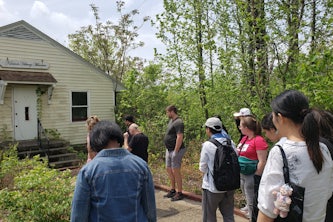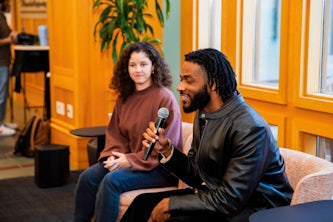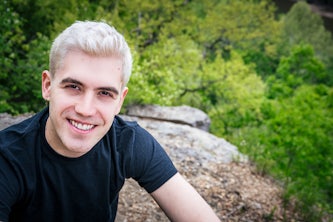BME internship gives students hands-on experiences
The St. Louis Internship Program for Biomedical Engineers benefits local companies and students alike
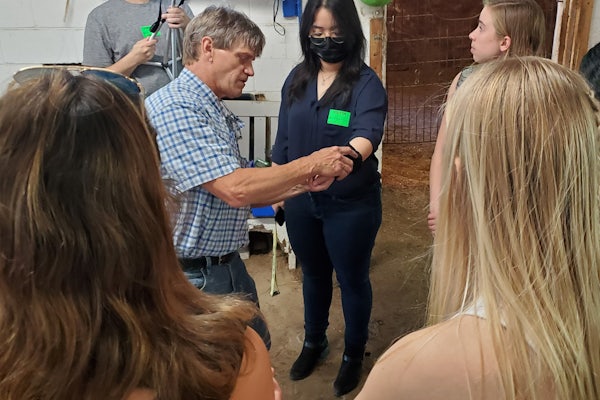
Each year, the Department of Biomedical Engineering in the McKelvey School of Engineering offers the St. Louis Internship Program for Biomedical Engineers that connects students with small local companies to gain hands-on experiences.
“The program exposes the students to the challenges of startups,” said Joe Klaesner, professor of practice in biomedical engineering and the Division of Engineering Education and internship program director. “Students gain technical insights related to working on real-world applications and also learn the soft skills that are needed to be successful in the workforce.”
Klaesner said he hopes the program inspires students to take their ideas and create their own startups or stay in St. Louis after graduating.
“I am from St. Louis, so I hope exposing students to St. Louis companies might encourage them to find a job in St. Louis, keep their talents here, and make St. Louis a better place,” Klaesner said.
This summer, 11 students participated in the program at nine different companies. Most of the organizations are startups, which gives students the opportunity to have a more direct role.
The internship program is made possible annually with a recurring gift from Leung Tung Peter Young, who earned a bachelor’s degree in chemical engineering from the Engineering School in 1980, and Lin Young. As a business owner of 40 years, Leung Tung Peter Young encourages students to seek out internships early to help build their networks and benefit their future goals.
“Building networks is very important,” Young said. “One or any number of positive references will be good for the future.”
Meet some of the interns and read more about what they learned, how their internships helped shape their engineering education and their advice for other students.
Missy Pear
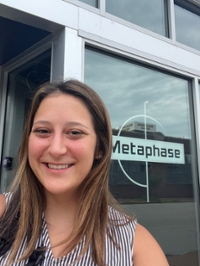
Metaphase Design Group
What type of work did you do as part of your internship?
I have been working with the Human Factors and Research Teams to develop protocols for validation testing with various medical device and pharmaceutical companies. I've written different moderator guides, screener scripts, data entry forms and other items needed for the validation testing and IRB approval.
How did this help you develop into a better engineer?
One of the biggest takeaways from this internship has been my ability to refine my communication skills. With a BME background, my internship has helped me to realize how valuable technical and problem-solving skills are. However, I have learned what is even more valuable is the ability to combine both the technical skills with more of the social skills, figuring out how to effectively communicate with all users of a device. My time at Metaphase has given me better insight into the regulatory pathways of medical devices, some of which I started to explore in Senior Design.
What was the most challenging part of this experience?
I have most definitely experienced challenges understanding how a medical device works (on a device where we are conducting a validation test and had to guide a user through using it). Between having put together multiple circuits and having gone through the design process, those experiences helped me to overcome these challenges and take a step back to better understand the product at hand.
What advice do you have for students seeking internships?
Be sure to do your research on the companies and positions you are most interested in and reach out to people who might have been in the role before you. Even if you don't have much experience in the role that you are interested in, think about how some of your previous experiences may help you to succeed in the role or give you an interesting perspective into it.
Gabrielle VanderVinne
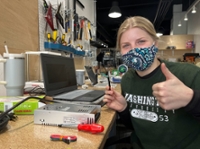
UN&UP
What type of work did you do as part of your internship?
As a part of my internship, I am working on device/system integration and protocol development for UN&UP’s infusion system. I am gathering lots of data every week to test the different infusion system designs they have come up with along with altering the current designs to make them better.
How did this help you develop into a better engineer?
This internship has helped me develop into a better engineer simply because of the hands-on experience I am getting. While the WashU BME course curriculum is amazing, getting hands-on experience is invaluable. Through this internship, I am allowed to apply what I have learned in the classroom to real-world applications and problems, which has helped me further my skills as an engineer.
Another project that UN&UP specifically incorporates into this internship program is a mini I-Corp project. For this project, I am given a specific technology that UN&UP believes may hold promise in the future. This process relies on the NIH I-Corps model of customer identification, needs matching and commercialization pathway layout. Simply put, I do some initial research on my given topic and interview various individuals within the field with the goal to identify if my topic can fulfill some need within the current health care market. This project has allowed me to gain experience in proposal development and helped me to become more comfortable interviewing doctors and scientists in a way that sheds light on my topic.
What was the most challenging part of this experience?
The most challenging part of this experience is learning how to think on your feet and problem solve in real time. As part of my internship work, I often come across multiple problems daily. Over the past eight weeks, I have learned how to “think outside the box” to solve these challenges, some of which are simple and others that are more complicated. The BME curriculum, specifically the lab components, is often a structured environment in which the lab instructors and AIs help you when you get stuck. However, in an industry setting, you need to be able to handle unexpected problems quickly and without panicking, which is something I have significantly improved since the beginning of my internship.
What advice do you have for students seeking internships?
My advice for students seeking internships is to start looking early and to always be looking for an internship. You never know where an opportunity may lie or when an opportunity may present itself. You also can’t be afraid of rejection. Apply for as many internships as you can because even if you think you may not be qualified, chances are half of the other applicants are thinking the same thing.
Katie Feeney
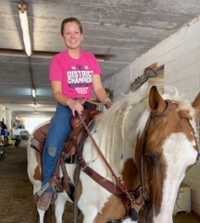
Equine Smartbit
What type of work did you do as part of your internship?
Data organization and collection, CAD drawings for new chip casings, prototype demonstrations.
How did this help you develop into a better engineer?
We had plenty of issues with the product during my time as an intern, but that helped me to learn that not everything works on the first time or is ever going to be perfect. This internship helped me understand the rigorous testing and fixing it takes to get a product even to a stage at which it can be demonstrated.
What was the most challenging part of this experience?
The setbacks were probably the most challenging part. We had it working, and then we didn’t, and then we did, and then we didn’t. It was difficult to even want to still work on it when it seemed like we would never get it fixed. However, that is what engineering is — solving more and more problems as they arise.
What advice do you have for students seeking internships?
Find the people who you enjoy being around. I have made some of the best friends I’ve ever had through this. The people are half of what you do, and they can make your internship so fun or can make you dread going into work every day.
Mugdha Sinha
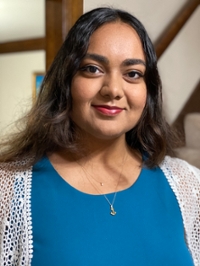
UN&UP
What type of work did you do as part of your internship?
Most of my work is hands-on, as my main goal is to help build a flow system and phantom to simulate nanoparticle infusion and collection at the site of a stroke. This would include 3D printing apparatus-specific parts and calculating flow rates of lab-grade substances that mimic physiological flow rates. I am also working on researching future markets for fibrinolysis needs specifically in organ transplants. For this project, I reached out to doctors and researchers to gain insight into this field of study and have chats with them to see how big of an issue this is and if there is a need for a (better) solution.
How did this help you develop into a better engineer?
This internship enhanced my skills in CAD software, which is a staple in the engineering world. Not to mention the iterative nature of engineering testing strategies. I also gained skills in troubleshooting in a non-research environment, which will definitely aid my journey as an engineer.
What was the most challenging part of this experience?
The most challenging part of this experience was being able to get in contact with people in academia for my market research project. It definitely was a new skill I had to learn in how to reach out to people in the field of study.
What advice do you have for students seeking internships?
The biggest advice for other students seeking internships would be to keep reaching out and applying. Oftentimes, especially for BME internships, it's super frustrating to apply for internships but never hear back from them. Find ways to make a contact with someone in the company, use LinkedIn and other resources like it, and be consistent!

